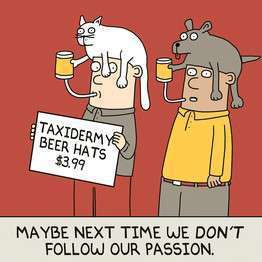If you’ve ever been to a management conference, or read a leadership book, or wondered what went wrong (if you’re a pessimist) or right (for the other guy, if you’re an optimist), chances are you’re familiar with the story of the million-dollar NASA pen and the travails of the cartoon character Dilbert as he copes with office politics and corporate bureaucracy.
I happened to come across discussions of both this week. And since we here at CCJ have a brand-interest in trucking innovators, I’m always on the look-out for successful models and methods that might be applied to trucking – and for leaders who apply them ahead of the curve. (Heads up: the CCJ team will be on the trail of industry innovators at the American Trucking Associations Management Conference and Exhibition starting this weekend. Keep an eye on ccjdigital.com or follow @CCJnow on Twitter.)

For those who don’t know about space pens, or who never got the chain email that makes the rounds, the story is summarized nicely this week on Kottke.org, one of the longest-running web logs, or “blogs” as the kids today call them. Of course, the way the web works, that post was just a summary of the more complete explanation on Snopes.com, debunker of all things shared between people who believe I’m a French fashion model because I say so, right here, on the internet – mais oui!
During the space race back in the 1960’s, NASA was faced with a major problem. The astronaut needed a pen that would write in the vacuum of space. NASA went to work. At a cost of $1.5 million they developed the “Astronaut Pen.” Some of you may remember. It enjoyed minor success on the commercial market.
The Russians were faced with the same dilemma.
They used a pencil.
Except, you see, that’s not entirely accurate, however tempting it may be for folks with a certain political agenda to use the NASA pen as an exemplar of government waste. Pencils, NASA discovered, were dangerous in space – all those shavings and that lead dust floating around in primitive space capsules made a mess. But it just so happened a U.S. company had already invested a million bucks or so to develop a pen that would work in extreme conditions, so NASA ordered 400 and was gouged a whopping $2.95 each. The Russians, or Soviets, to be politically correct, soon switched as well.
The first lesson is one of context. Most people and organizations, even the U.S. government, are not entirely stupid. They should have a slightly better idea of what they’re doing than an outsider does. Outsiders need to get their facts straight.
The second lesson, of course, contradicts the first: The government, especially regulatory bodies, routinely violates the idea that we, the regulated, know what we’re doing. It’s not that they think people in trucking, for instance, are stupid – but bureaucrats know bureaucracy. Plus, the bureaucracy is led by politicians. Whom we, the people, elect. Never mind the first lesson, now that I think about it.
We get what we deserve. A quality, affordable pen ain’t so bad.
As for Dilbert, if you’re in management and you happen to spy a lot of old Dilbert cartoon strips push-pinned onto the cubicle walls in the corporate hive, you’ve either been reading the wrong leadership books or not paying attention to the good ones.
Adams brings his famous anti-management angle to The Wall Street Journal this week in an essay titled, “Scott Adams’ Secret of Success: Failure.”
He describes the effort as “a semientertaining tale about a guy who failed his way to success,” and it’s a warm-up for a new book coming out next week.
 Scott Adams
Scott AdamsEssentially, he argues that goals are self-defeating: either you reach them and you’re done (so what’s next?) or you don’t and feel like a loser.
But, he assures us, there’s a big difference between feeling like a loser and being a failure – if you fail well, that is – if you learn from the experience but stay the course. He preaches the importance of being patient and perfecting your systems, and sooner or later you’ll find a suitable opportunity and succeed.
He also has a pleasantly cynical take on “following your passion.” Businesses that work, typically, are boring – compared to starting a vineyard (because you love to drink wine). Who goes into dry-cleaning, or fast-food franchises, or even trucking because they’re passionate about it? On the other hand, many people do indeed become passionate about trucking – once they’re successful. The passion finds you.
While the “fail early, fail often” mantra has been popular among the hi-tech start-up community for some time, Adams’s take is more personal and nuanced. And funny.
Good stuff to steal the next time you have to come up with PowerPoint slides at a management conference.




![Mike & Truck[1]](https://img.ccjdigital.com/files/base/randallreilly/all/image/2013/10/ccj.Mike-Truck1.png?auto=format%2Ccompress&fit=crop&h=167&q=70&w=250)






